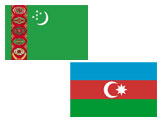|
|
TODAY.AZ / Politics
Azerbaijan seeks new dialogue with Turkmenistan
01 March 2007 [13:00] - TODAY.AZ

For most of the post-Soviet era, relations between Azerbaijan and Turkmenistan, both large-scale energy producers with Turkic cultures, have been frigid at best. Long-standing territorial wrangles over rights to the Caspian's seabed caused most of the trouble. In the late 1990s, those differences prompted former Turkmen leader Saparmurat Niyazov to back away from a deal to jointly develop the Kapaz oil field (known as Serdar in Turkmenistan), located between the Azerbaijani and Turkmen sectors of the Caspian. More recently, Azerbaijani-Turkmen tension hindered progress on the Trans-Caspian Pipeline (TCP), a regional project designed to carry 32 billion cubic meters of gas per year from the Caspian Basin to European markets, while bypassing Russia.
Niyazov's death in December 2006 provided Baku with an opportunity to make a fresh diplomatic start. Speaking on the Russian radio station Ekho Moskvy on December 22, the day after Niyazov's death, President Ilham Aliyev declared that "Azerbaijan is ready for cooperation with Turkmenistan."
A second message, sent on February 15 in a letter of congratulations to new Turkmen President Gurbanguly Berdymukhamedov, sought to stimulate a bilateral dialogue. Aliyev described Azerbaijan and Turkmenistan, which withdrew its ambassador from Baku in 2001, as "good neighbors" who "support each other" and whose "joint efforts will be aimed at [the] expansion of bilateral interstate relations." Aliyev also extended an invitation to Berdymukhamedov to make a state visit to Azerbaijan. The Turkmen leader has not yet responded to the offer.
Energy interests -- especially TCP -- appear to be driving the Azerbaijani goodwill campaign. Amid growing European concerns about Russia's reliability as a gas supplier, Azerbaijan has started to tout its own potential as an energy conduit that links Central Asia and Europe. Aliyev made that pitch directly to European leaders at the World Economic Forum in Davos, Switzerland in late January.
In comments to the Trend news agency on February 15, Sabit Baghirov, former president of the State Oil Company of Azerbaijan and the current head of the Azerbaijan Entrepreneurship and Market Economy Development Fund, stated that convincing Turkmenistan to join the TCP project is a priority for Azerbaijani diplomacy.
The European Union and the United States, both strong backers of TCP, are likely to encourage Azerbaijan's overtures to Turkmenistan, commented Ilham Shaban, editor of the Turan-Energy daily news bulletin. The EU is especially interested in lining up gas suppliers other than Russia. Since Niyazov’s death, Brussels has allocated 1.7 million euros (over $2.24 million) to conduct a feasibility study concerning Turkmenistan's participation in TCP, Shaban said. A four-company consortium made up of the British engineering consultants MottMcDonald Ltd, Greek firms Kantor Management Consultants and KLC Law Firm, and the Azerbaijani ASPI Consulting Engineers company is expected to complete the evaluation by mid-2008.
Completion of the British Petroleum-run Baku-Tbilisi-Erzurum gas pipeline, which could deliver Turkmen gas to Europe without relying on Russian transit routes, stands to strengthen TCP’s attractiveness for Central Asian states, in particular Turkmenistan and Kazakhstan.
Nonetheless, the project's prospects remain vague, Shaban said. Russian opposition to a pipeline that "would really and very seriously weaken Gazprom's position in Europe" is a major obstacle, he explained.
Turkmenistan's ability to even meet TCP's production goals is another unanswered question. The country recently pledged to supply 30 billion cubic meters (bcm) of gas per year to China starting in 2009. It has also indicated that it will increase supplies to Russia to 80-85 billion bcm per year. Therefore, concerns exist about "whether Turkmenistan has the capacity to export such volumes of gas within the coming 10 years," Shaban said.
Meanwhile, Azerbaijani officials say that they are waiting for Turkmenistan to make the next move. "The Azerbaijani government has already done its best to invite Ashgabat to cooperate. Now it is up to Turkmenistan's government how to reply," commented one senior Azerbaijani diplomat, who asked to remain anonymous.
Whether a response will ever come, and what it will say if it does, remains anyone's guess, Baku observers say. Given the lack of information about Berdymukhamedov's political and economic agenda, predicting relations with Turkmenistan is "like fortune telling with coffee grinds," commented political analyst Ilgar Mammadov.
By Rovshan Ismayilov
/www.eurasianet.org/
URL: http://www.today.az/news/politics/37204.html
 Print version
Print version
Connect with us. Get latest news and updates.
See Also
- 28 August 2025 [14:34]
Azerbaijan joins CIS Deputy Prosecutors General meeting in Moscow - 28 August 2025 [11:33]
President Ilham Aliyev receives EU Special Representative for South Caucasus - 28 August 2025 [11:11]
Baku has put all the dots above the "I" in the issue of the Zangezur corridor - 28 August 2025 [10:10]
And who’s back there again? Konstantin Zatulin once more. - 27 August 2025 [11:27]
President: The biggest threat to the Muslim world is sectarian division - 27 August 2025 [10:46]
Zangazur Corridor not to be East-West, but also North-South transportation corridor - President - 27 August 2025 [10:13]
President Ilham Aliyev gave interview to Al Arabiya TV channel - 27 August 2025 [10:10]
Pashinyan told the Armenians what Azerbaijan has been saying for a long time - 25 August 2025 [15:16]
ANAMA: Nearly 1,500 hectares made safe in demining push - 25 August 2025 [14:14]
Radicals have invented new enemy for Iran
Most Popular
 Trapped in past: how Persian nationalists bankrupt Iran's future
Trapped in past: how Persian nationalists bankrupt Iran's future
 LG Chem expands its portfolio for more sustainable future
LG Chem expands its portfolio for more sustainable future
 Ethnic Kazakhs return to Kazakhstan since its independence
Ethnic Kazakhs return to Kazakhstan since its independence
 Telegram users can now add music to their profile
Telegram users can now add music to their profile
 European Post suspend shipments to United States
European Post suspend shipments to United States
 Hyundai and Genesis top 2025 J.D. Power tech rankings
Hyundai and Genesis top 2025 J.D. Power tech rankings
 Summer camp for young scientists held in Gazakh
Summer camp for young scientists held in Gazakh
